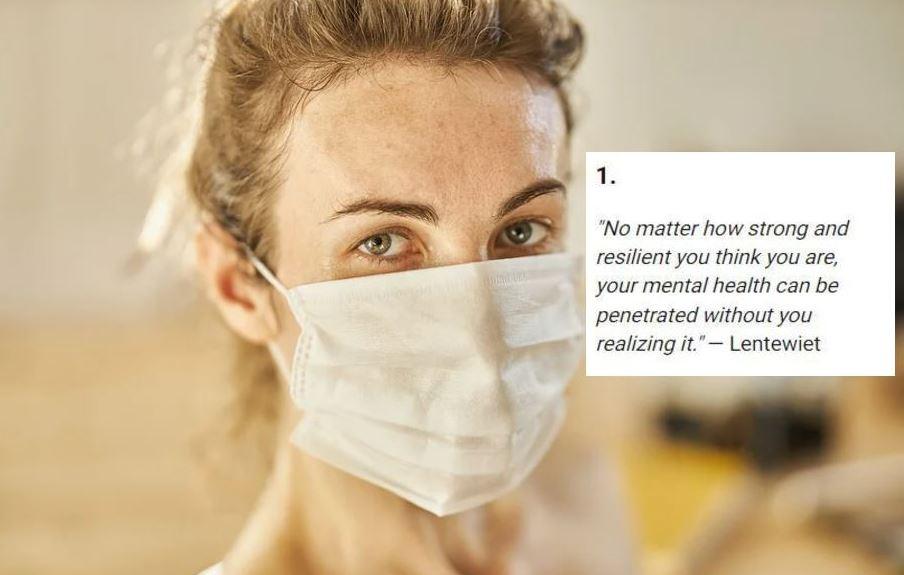Two-and-a-half years after the COVID-19 pandemic came to America, things are slowly returning to normal. Although people are still catching the virus, the seven-day average of deaths is around 15% of where we were at the pandemic’s peak. Lockdowns and mask mandates are over, kids are all back at school and there’s a definite feeling that the worst is behind us.
The last 30 months have been a time of anxiety, loneliness, fear, sickness, death, misinformation, and political and economic upheaval. Over that time, most of us were forced to change how we worked, socialized and learned. Even as the pandemic winds down, we live in a world that will never return to what it was like before the virus.
Now’s the time to try to make sense of what we’ve all been through so that if there’s a next time, we know how to do things better.
A Reddit user by the name Affectionate-Ad1060 asked the online forum, “What is the most important lesson learnt from Covid-19?” and they received more than 19,000 responses.
Some thought that the pandemic taught them the importance of being around people. Others realized that maintaining one’s mental health isn’t just about resilience.
A lot of people were discouraged by how incredibly selfish some acted during the pandemic. Many were surprised by the number of people who put their political beliefs ahead of the health of themselves and others.
A lot of our norms and assumptions about society have been significantly challenged over the past two and a half years. The only way that we can create a feeling of hope that things will be better the next time is to examine the lessons learned from COVID-19 so we can be better.
Here are 21 of the most important lessons that people learned from COVID-19.
1.
“No matter how strong and resilient you think you are, your mental health can be penetrated without you realizing it.” — Lentewiet
2.
“You should take the time to spend with those you love.” — idontworktomorrow
3.
“That it wouldn’t take much for civilized people to turn on each other.” — hindmaja
Strength-in-the-Loins added:
“A wise man once said something like ‘Humanity is perpetually 9 meals away from utter barbarism.”
JimmyHammer12 really put the nail on the head with their response:
“It could also be said based on the way people went FOMO for all that toilet paper that ‘Humanity is perpetually 9 rolls away from utter barbarism.’”
4.
“People’s mental health ain’t no joke… people need people.” — vg4030
5.
“Pandemic was just the proverbial group project in school all over again. A couple of intelligent and hard-working people trying to keep everything from falling apart while the rest sit on their ass or choose to straight up sabotage everything. Yet somehow everyone gets the exact same grade.” — NaughtyProwler
6.
“Bold of you to assume we’ve learned anything.” — Airsoft07
7.
“Healthcare needs a overhaul.” — Toxic_Politician
8.
“The extent to which politicians will sell out public health for their political advantage is much higher than I thought. Usually, life or death situations are good for all politicians, just be a voice of stability and hope and you’re good. We all pull together and get through it. This time, dividing us intentionally to cause chaos? I still can’t believe real people did that.” — Griswald
9.
“Most schools weren’t as ready to switch to digital methods as they bragged about.” — SenpaisReisShop
10.
“Most grown adults are nasty and have to be reminded to wash their hands.” — shantyirish13
11.
“The ‘supply chain’ is far leaner and vulnerable to the vagaries of pandemic conditions than most had thought.” — Back2Bach
12.
“You can have all the free time in the world and still manage to do nothing with it.” — hogaway
13.
“We need to teach statistics and critical thinking better.” — hardsoft
14.
“I work in childcare. We learned that children really need socialization. You would think with time off parents would work on things. Kids came back to daycare, not potty trained, still using a pacifier, speech behind, and refusing to share. It’s better now but it was really interesting seeing a child pre-Covid who you potty trained…. Come back months later acting pretty helpless. don’t know if it’s parents, the lack of social pressure, or just some other thing. But it was an interesting experience.” — Paceim
15.
“People are willing to die over politics.” — morinthos
16.
“That 50% of jobs can be done from home while the other 50% deserve more than they’re being paid.” — Kayin_Angel
17.
“That being tied to the office, working insane hours, super long commutes are not necessary.” — squashedfrog
18.
“People make irrational decisions when afraid.” — AaaON_
19.
“During covid, I was laid off for months and spent that whole time keeping up to date on everything going on in the world. I mean everything I possibly could, every single day. I reached the point of obsession and the massive amount of negative crushed me. There was so much bad going on so much suffering that eventually, one day I just set it all down and said I’ll check in in a month. Best decision I made that year, the only thing that kept my sanity. Just taking time away and not bathing in it every day.” — Primerallen
20.
“People will listen to politicians over their doctors.” — GhostalMedia
21.
“A decent amount of people I work with surprised me a lot during the pandemic. People I used to have some respect for revealed themselves as complete idiots. It was really sobering.” — RiW-Kirby






































